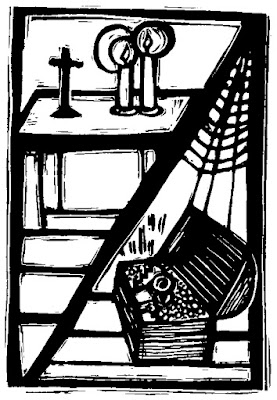8th Sunday in Ordinary Time A
Readings Isaiah 49:14-15 1 Corinthians 4:1-5 Matthew 6:24-34
This Sunday’s liturgy proclaims God’s providential care for his people: the city of Jerusalem after its destruction by the armies of Babylon and Christian disciples who choose to serve God rather than glory or money. Let us listen to the wisdom of God in the words of our responsorial psalm, “Only in God is my soul at rest;/ from him comes my salvation” (Ps 63:2).
The Old Testament reading from the Book of Isaiah is addressed to the people of Jerusalem/Zion after the city’s destruction by the Babylonian armies in 587 B.C. The Book of Lamentations gives a poignant picture of fallen Jerusalem as a widow who has been abandoned by her husband. “How lonely she is now,/ The once crowded city!/ Widowed is she/ who was mistress over nations;/ the princess among the provinces/ has become a toiling slave” (Lamentations 1:1). The prophet picks up on this imagery of personifying Zion as a forgotten wife. “Zion said, ‘The Lord has forsaken me/ my Lord has forgotten me.’” Then, using the striking image of the Lord as a mother to Jerusalem, the prophet affirms that she will never be forgotten by God. “Can a mother forget her infant,/ be without tenderness for the child of her womb?/ Even should she forget,/ I will never forget you.” In his providential care in fulfillment of this prophecy, the Lord raised up Cyrus the Persian to defeat Babylon, release the Jewish exiles and decree that they should return and rebuild the Lord’s temple (cf. Isaiah 44:24-28; 2 Chron 36:22-23; Ezra 1:1-4).
In the second reading Paul continues his argument that he and all true apostles are concerned with building up the Christian community and not with personal achievement. Apostles are “servants of Christ and administrators of the mysteries of God” and not flashy workers of miracles that bring personal renown. Administrators must prove to be trustworthy, not in human courts, but before the judgment seat of the Lord. Although Paul has nothing on his conscience, he does not even pass judgment on himself and is convinced that the true apostle will be revealed at the triumphant return of Christ in judgment. “He will bring to light what is hidden in darkness and manifest the intentions of hearts. At that time, everyone will receive his praise from God.”
The Gospel reading continues Matthew’s Sermon on the Mount with Jesus’ warning that his disciples must choose which kingdom they will serve: the perishable kingdom “on earth” or the lasting kingdom “in heaven.” The choice of God over “mammon” should be a liberating one which frees them from anxiety over life, food, drink and clothing. The basis for confidence in making the choice for the kingdom of God and his righteousness is the beautiful image of God who cares for “the birds of the air” and “the lilies of the field.” Jesus reminds his disciples that they are of much more value in their Father’s eyes than these. This image of God’s providential care is not meant to encourage a kind of passive acceptance of the world as it is in all its injustice, but is to be a rock of hope in God’s care as one risks the daring life of choosing to serve God rather than worldly wealth.

No comments:
Post a Comment